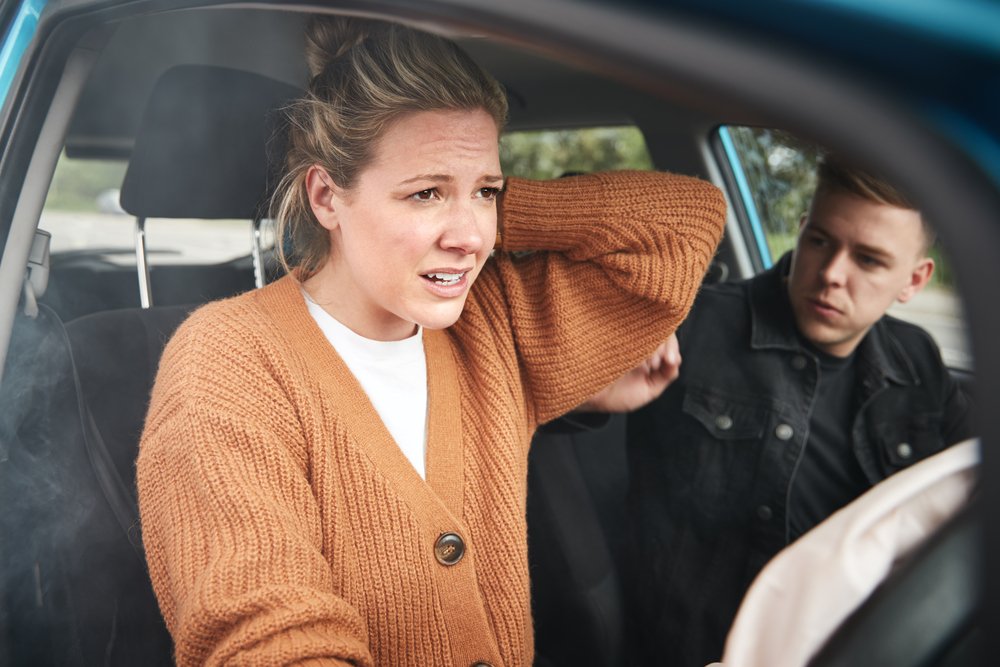 Most drivers have a basic understanding of what their rights are when they’re in a car accident: Simply put, the driver at fault (or, more likely, their insurance) pays for the expenses of the other driver. This could include not only repairs to or replacement for their vehicle, but medical expenses, lost income, pain and suffering, and other damages. But what if you were a passenger in the accident? What rights do you have? Can you sue for your injuries? And if so, who should you file suit against? This article will give you a basic overview of passengers’ rights when involved in a car accident. If you’ve been injured as a passenger in a car accident, please reach out to our personal injury attorneys for a consultation.
Most drivers have a basic understanding of what their rights are when they’re in a car accident: Simply put, the driver at fault (or, more likely, their insurance) pays for the expenses of the other driver. This could include not only repairs to or replacement for their vehicle, but medical expenses, lost income, pain and suffering, and other damages. But what if you were a passenger in the accident? What rights do you have? Can you sue for your injuries? And if so, who should you file suit against? This article will give you a basic overview of passengers’ rights when involved in a car accident. If you’ve been injured as a passenger in a car accident, please reach out to our personal injury attorneys for a consultation.
Basics of Passenger Rights
Your rights as a passenger in a vehicular accident are much the same as they are when you’re the driver: Your expenses—including medical bills, pain and suffering, and so on—should be paid for by the driver at fault. It doesn’t matter if the person at fault was driving the vehicle that you were in or another car involved in the accident.
The Police Report
The scene of a car accident is often chaotic, and proper procedures and paperwork are probably the furthest thing from your mind. However, if you are medically able to, it’s important to ensure that you are listed as a passenger in the accident. Speak to an officer on the scene to make sure this is done. If you’re not in a state to handle this at the scene of the accident, don’t worry; you can take care of it later by reaching out to your insurance company and notifying them of the accident.
Filing a Claim as a Passenger
Speaking of contacting your insurance company, you should do so to file a claim as soon as possible. As we’ve already mentioned, your expenses should be paid for by whichever driver was at fault. If it’s unclear who was at fault in the accident right away, you can file a claim against both drivers’ insurance companies. This ensures that your claim is processed as quickly as possible once fault is determined; the at-fault driver’s insurance company can begin handling your claim right away, and the other will simply deny the claim once its determined their customer was not the one at fault.
Make sure to get the insurance information for both drivers as soon as you can. If injuries permit it, you can do this at the scene of the accident. If not, your insurance company can get a copy of the police report and request the necessary information. At the very least, you should be able to get the insurance information for the driver of the vehicle you were in.
Filing against Friends and Family
Frequently, passengers’ injury claims must be filed against the driver of the vehicle they were in—and that’s often a friend or family member. This is especially true of single-vehicle accidents, when the driver of your vehicle might strike a tree, animal, or other obstacle without involving another car. Many passengers may hesitate to file a claim against a loved one for fear that it will damage your relationship. However, you can and should pursue compensation for any injuries you sustained during the accident.
It’s important to remember that you are not suing the individual, but are filing a claim against their insurance company. The insurance company is the one who will pay your expenses, not your friend or family member, so you should feel comfortable moving forward with any claim you need to file.
Passengers’ Responsibilities
Of course, passengers are not necessarily free of any blame in every incident. Though you are not driving the vehicle, as a passenger in the car, you still have some responsibility to ensure your own safety and the safety of others in the vehicle. If it’s determined that you contributed to the accident, or that you caused or worsened your own injuries in some way, this may impact your claim.
The most common example here would be not wearing a seatbelt. If you choose not to wear a seatbelt as an adult in someone else’s vehicle, you could be considered partially responsible for your own injuries. Additionally, if it’s determined that you were encouraging the driver to engage in reckless behavior while driving, any claims you make could be denied. So, whether you are a driver or a passenger, it is equally important that you make smart decisions to protect everyone in the vehicle at all times—including yourself.
If you’ve been involved in a car accident and you’re having trouble getting the compensation you deserve, contact Harr Law today to schedule a consultation. Our personal injury lawyers will help you better understand your rights and will fight to get you fair compensation for your injuries.